How to Check a Canoe Safari in Africa Off Your Bucket List

We sat on an island in the middle of the Zambezi River having arrived via canoe. Behind us, something stirred in the bushes, with a quick flash of my torch I could see the bull elephant keeping a watchful eye on our camp.
We turned back to our conversation, lest we disturb him. It would not be long until we were visited in the night by the waking hippos and a few buffalo. Providing us with an urgency to head fast asleep in our tents while listening to the sounds of Africa.
An Introduction to the Mighty Zambezi River

The majority of people know the Zambezi River for her crowning feat, Victoria Falls. It’s the quintessential destination for any traveler in Africa, and its roots stretch back to colonial times and tribal kingdoms. Victoria Falls swallows a huge river as it dives into a narrow gorge.
From deep below the gorge a massive plume of mist sprays high into the sky. It results in a rainforest surrounded by arid land often plagued by year-long droughts and seasonal rains.

The river continues its journey to the sea through the narrow Batuka Gorge before forming the massive man-made Lake Kariba. It is the largest man-made lake on earth and is said to trigger small regional earthquakes from the sheer weight of the Zambezi’s waters. Kariba is an area seldom explored by most travelers and holds some true gems. We tackled the Southern coast of Kariba only six months prior to this journey and witnessed some of the most spectacular sunsets at Musango Safari Lodge.

After passing through the Kariba Dam the lake slowly widens as it makes it way through a wildlife corridor of National Parks and Hunting Reserves between Zambia and Zimbabwe. The Zambezi Valley is unique in its large wilderness area as the Zambezi divides both the Lower Zambezi and Mana Pools National Parks. This large wilderness creates a biodiversity hotspot perfect for one of our favorite adventures and experiences in Africa – a canoe safari.
Canoe Safari on the Zambezi River

There are plenty of adventures to be had in Africa, but none are more deeply connected to the roots of adventure in Africa than a canoe trip down the Zambezi. After all, it was the famous David Livingstone that found Victoria Falls via canoe to utter the famous line of “the smoke that rumbles.”

Now canoe safaris are a popular day activity for numerous safari lodges along the Zambezi River. However, for the more adventurous there is the option to take a multi-day canoe trip down the river. We were fortunate enough to experience this one of a kind trip with the experts at Natureways Safaris last summer.

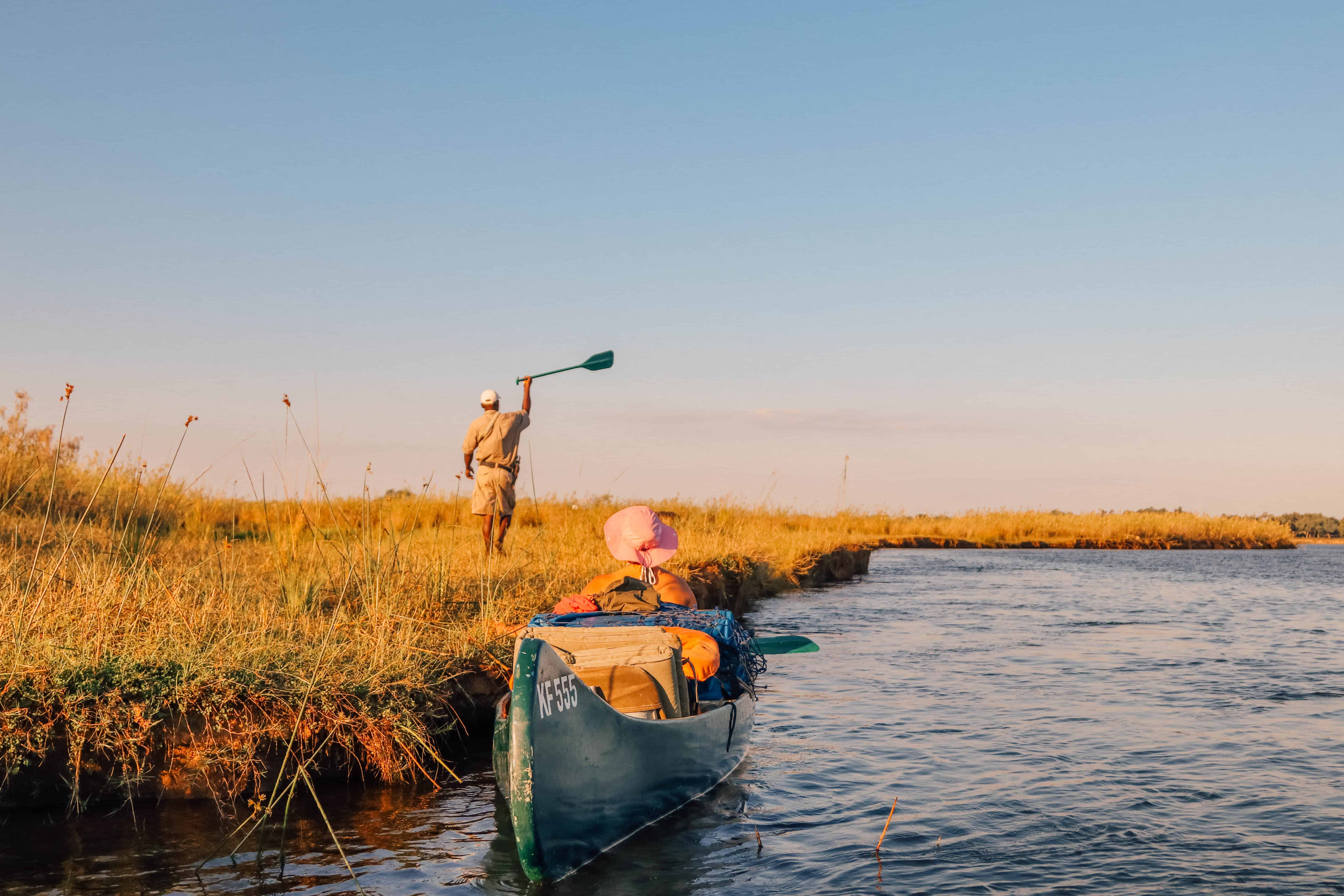
Our canoe safari launched from the Chirundu border post between Zambia and Zimbabwe with an end goal of making it 90kms down the river to Mana Pools National Park. The Tamarind Canoe Safari is the most popular canoe safari route to take on the Zambezi River. The journey would take us four days and three nights and we had to be totally self-sufficient.
Life on the Zambezi River
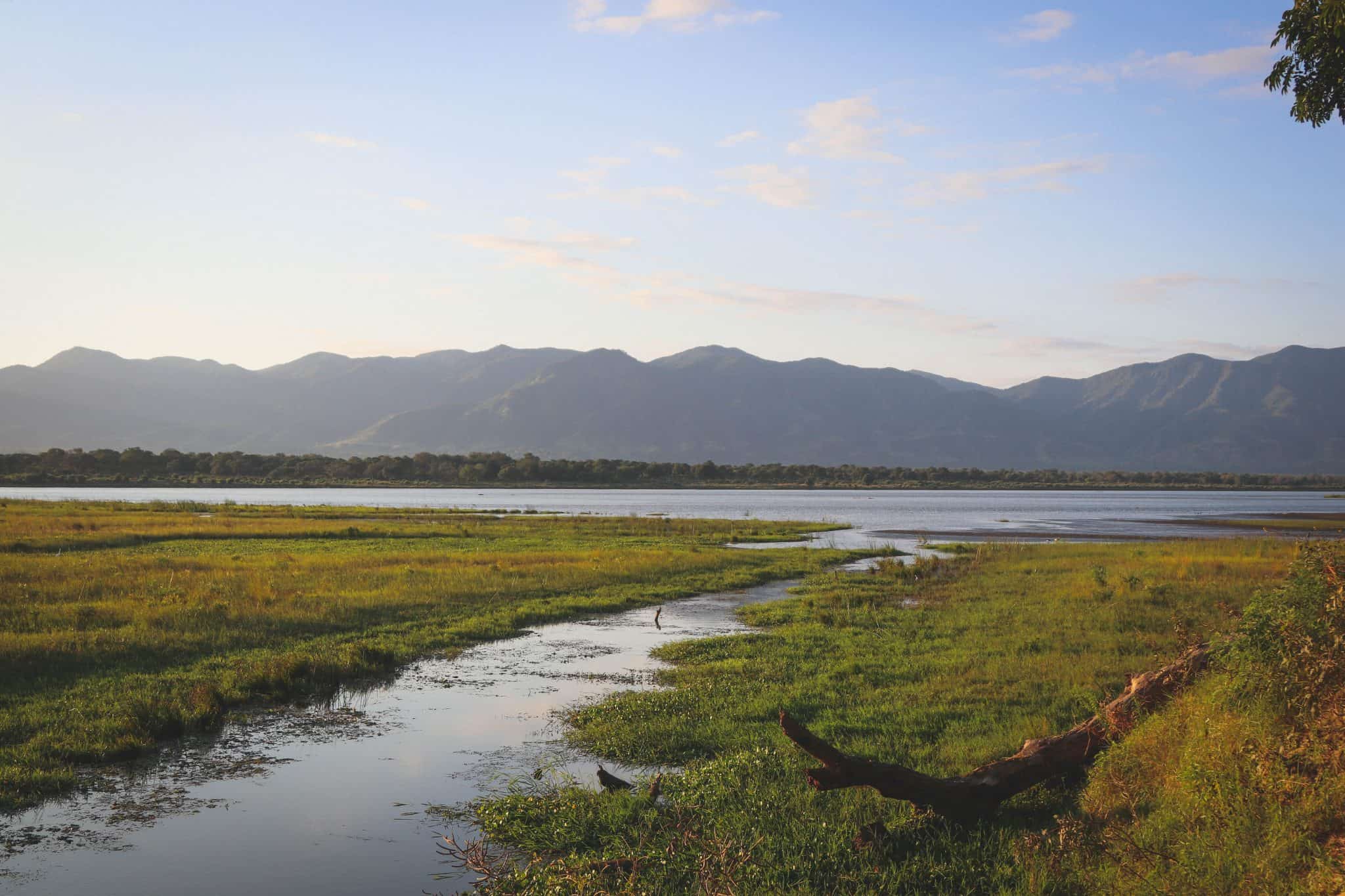
As you travel further down the Zambezi River access becomes more difficult. Roads, towns, and villages slowly start to disappear and the wild reigns supreme, this is where a canoe comes in handy. Lions, elephants, leopard, hippos, crocodiles, and buffalo are at the top of the food chain here. It is “Big Five” territory, a group of animals regarded for their tendency to kill humans. Of course, this was not an adventure we could tackle alone.

There is no support team- just the guest, guides, dangerous wildlife, and an ancient river. Our guides navigated a maze of sandbanks, hippos, and islands crossing back and forth between Zambia and Zimbabwe. All while we watched wildlife from the safety of their canoe.
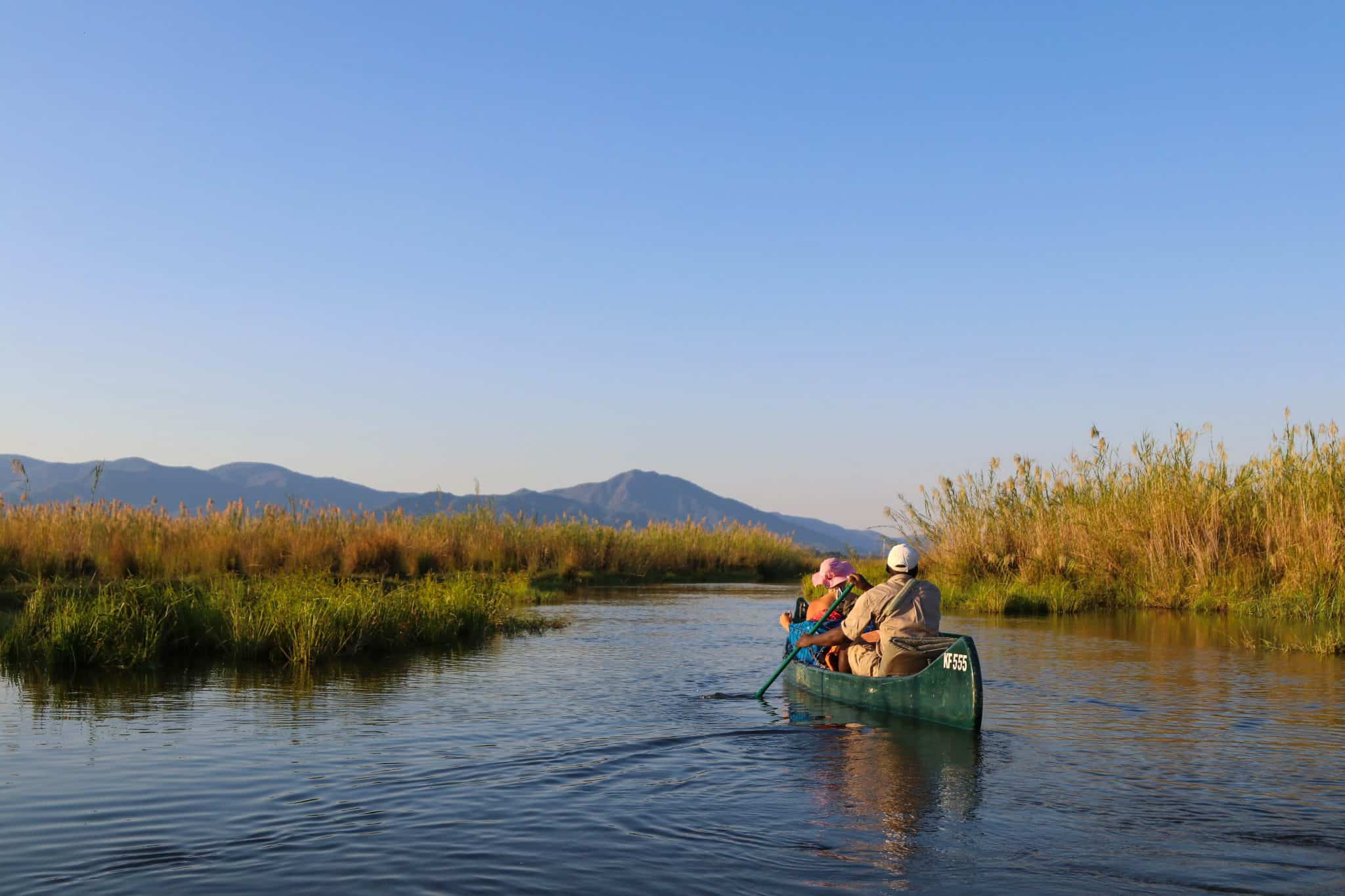
A common sight along the banks of the river are elephants as they cross between parks and enjoy the soft grass of the islands. Birds such as African skimmers, carmine bee-eaters or pied kingfishers would dart along the river taking full advantage of the abundant river.
It is impossible to escape the serenity of the trip, and although coming face to face with a hippo is exciting the average day is relaxing as long as you don’t mind paddling. You spend the majority of the trip sliding between narrow channels lined with river grass, if you bring your own booze you can even do it with a beer in hand.


Some of most amazing moments began with the start of a new day as the sun rises over the river. Best enjoyed with a morning coffee or tea while packing up camp. You paddle for a few hours before making a stop for breakfast or you can opt to knock out the majority of paddling and have a brunch.
After a nice siesta, you finish up the day in warm afternoon light before setting up camp on one of the many islands. Of course, not without time to take a swim in the hippo and croc-filled Zambezi River in lieu of a shower.

Night time is an entirely different experience as camping on the islands of the Zambezi allows for you to be enveloped in the wilds of the mystical river. There is nothing like spending a night on a remote island in the African bush. As the river flows by, you hear lions and hyenas in the distance and hippos munching on the grass a few meters from your head.

One of the things I recall the most was a question Natasha asked one of our guides. “What do you like better, camping on these islands or being at home?” He looked around and replied, “Here, it’s quiet. There are no distractions, no lights, no loud noise, no TVs, just this…” the sounds of the bush quickly enveloped us. This may have been the moment we vowed never to live in a major city again.
Tips For A Canoe Safari

Health
We recommend you have current tetanus, typhoid, and hepatitis A & B vaccinations. Check if you’re going to a malaria zone (season matters). The drier the weather the less likely there will be mosquitos, as they need water to breed.
Weather
There are two main seasons – dry and rainy. During the dry seasons, temperatures vary widely and vegetation is sparse. It is considered a good season for safari as animals are easy to spot with low vegetation and they congregate around water sources.
The rainy season is considered offseason and it’s hard to find an operational tour as the area becomes difficult to access, this lasts from December to April. If you go for the shoulder season you can find better rates and cooler weather.
What to Pack
This safari packing list is a great starting point for any safari. When you’re on a canoe safari a good safari hat is a must along with sunscreen and sunglasses. I would also recommend bringing a good book for mid-day siestas.
Tipping
Tipping your guides and service staff on safari is common practice. Your guides are working professionals who go to great lengths to be licensed and educated, all while keeping you safe. We personally tipped our guides $100 at the end of our three days on the river. Of course, it is all at your discretion.
Have a Guide
Our Zimbabwean guides TK, Casper, and Emmanual were downright amazing. They safely navigated us down the river and were highly knowledgeable about the bush. I would highly recommend booking a canoe safari experience with these guys and Natureways Safaris!
Mana Pools Park Fees
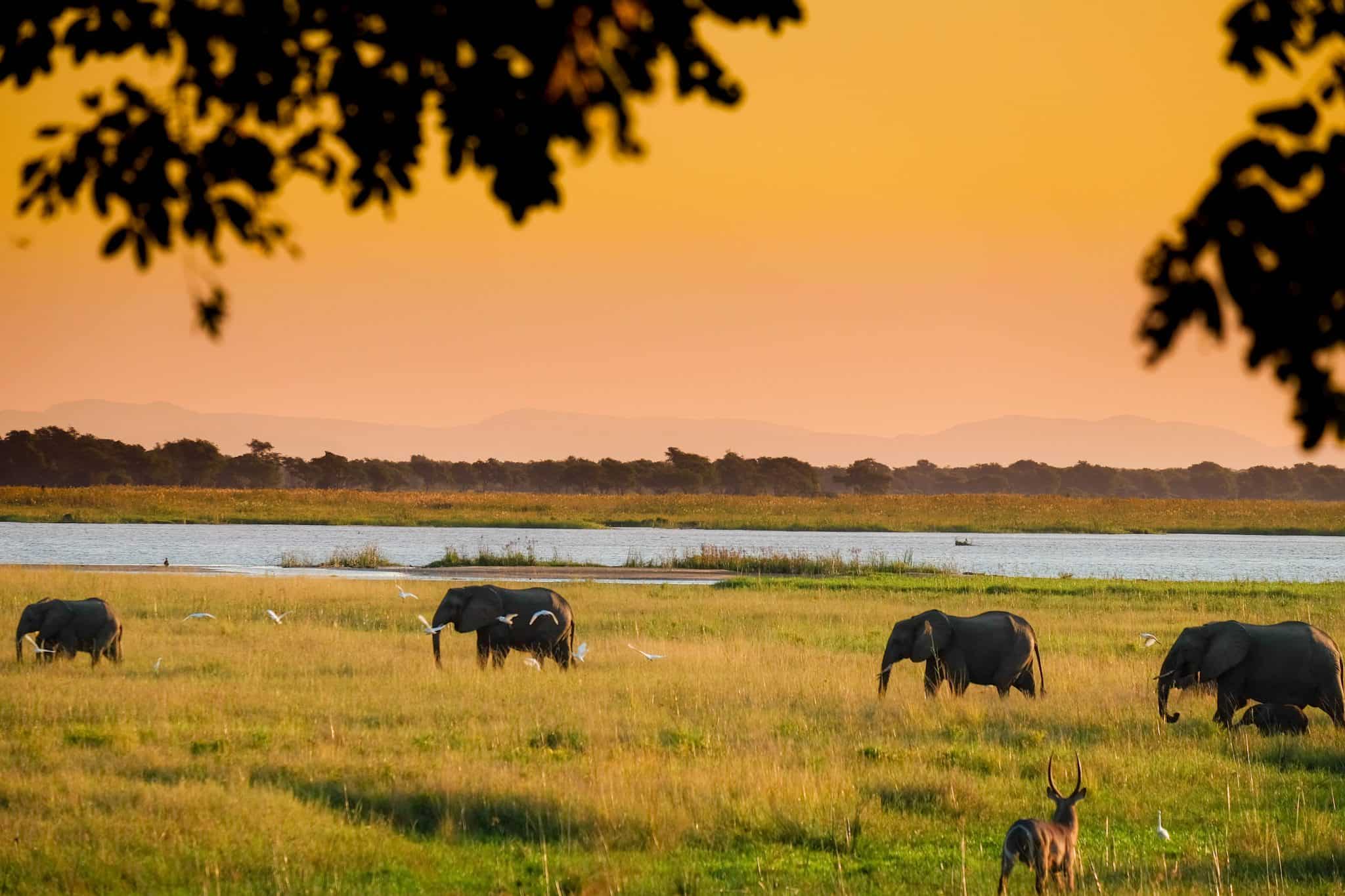
Mana Pools National Park is open all year round; however, the park is largely inaccessible from December to April. National parks in Zimbabwe are similar to many parks in Southern Africa and very affordable.
- Citizen: Adult – $8.00 USD per day
- SADC: Adult – $15.00 USD per day
- Non-resident: Adult – $20 USD per day
Private Vehicle Fees
- Locally Registered Vehicles – $5.00 USD per day
- Foreign Registered Vehicles – $10.00 USD per day
Final Thoughts on Canoe Safari
In all our time in Africa, the canoe safari down the Zambezi remains a highlight. It’s an activity that few get to enjoy and a chance to feel like your on a true exploration once again. Mana Pools and the Lower Zambezi are easily two of the best national parks in Africa for a safari.
General Info for Traveling in Zimbabwe

Visas to Zimbabwe
Visas for Americans traveling to Zimbabwe cost $30 USD payable in cash at the border. Visas are good for 30 days. Americans have the cheapest visas while the Canadians and Brits have it the worst at $75 and $55 respectively. More info on visas here. As we were traveling between Zambia and Zimbabwe we opted for the recently released KAZA visa that is a dual visa good for both countries, it costs $50.
Cash in Zimbabwe
Having enough USD before you enter is sure to make life easier. If coming from Livingstone there is a Barclays Bank in town that is able to change cash for you. If coming into Kariba, we found an ATM in Siavonga on Lake Kariba (Zambian side). The ATM’s in Zambia dispense Kwacha, so you will have to change that into USD before you enter. I would be hesitant to run out of USD anywhere in Zimbabwe besides Vic Falls, Harare, and Bulawayo.
Language in Zimbabwe
The three main languages in Zim are English, Shona, and Ndebele. You will be able to get by fine with English in Zimbabwe.
Food In Zimbabwe
The local meal in Zimbabwe is sadza and is a combination of maize, relish, and meat and it is delicious!
Want To Know More About Zimbabwe?

We drove around Zimbabwe and love the people and the country. Read more about travel in Zimbabwe!
Book A Safari in Zimbabwe

Traditionally, if you wanted to book a safari, you’d have to go to a travel agent and have them book it for you. Most of the industry still operates in this fashion. However, Timbuktu is a new platform that allows you to select the lodges you’d like and see the daily pricing. This way, you can choose the best itinerary for yourself. They will then contact the lodges and help you book your safari. With experts on staff, they can also provide suggestions and arrange the little details, much like a travel agent.
What To Pack For Zimbabwe
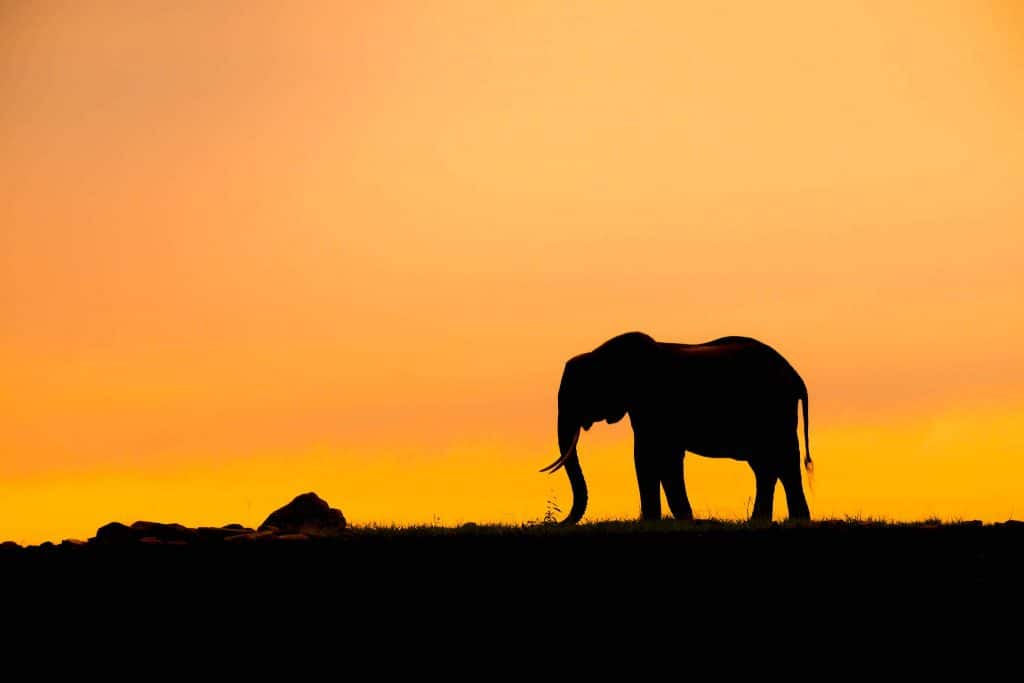
There are a few things that one should pack for an African Safari. We help you create your safari packing list and share some of our favorite safari products.
Plan Your Trip to Africa
- Travel Insurance: We don’t travel without travel insurance and neither should you. You never know what can happen while traveling so it’s best to be prepared. HeyMondo provides excellent short-term and long-term travel insurance plans.
- Travel Waterbottle: When we’re uncertain about the water supply we use our Grayl Purifier. It’s come in exceptionally handy around Africa.
- Camera Gear: Chances are you’ll want a camera for your trip to Africa. We love the Sony RX100V for a pocket-size camera and the Fujifilm XT-4 for a professional camera. Check out our favorite cameras for Africa.
- Safari Clothes: Lightweight, beige, and moisture-wicking clothing are great for traveling Africa. See our favorite safari clothing here.
- Safari Hat: A good hat is both stylish and functional.
- Safari Bag: A durable bag is ideal for traveling around Africa.
- Safari Pants: We recommend neutral-colored pants as they’re great at hiding dirt and can match most shirt colors.
- Safari Shirt: Shirts like these are lightweight and keep the bugs away!
- Boots: While you don’t need to wear sturdy shoes every day, at least one pair of safari boots will make your trip nicer!
- Travel Adapter: You’ll need a special travel adapter for traveling to Africa. Get one before you get there so you don’t pay a premium on the ground.

